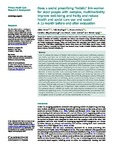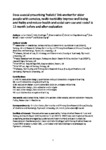Does a social prescribing ‘holistic’ link-worker for older people with complex, multi-morbidity improve well-being and frailty and reduce health and social care use and costs? A 12-month before and after evaluation
| dc.contributor.author | Asthana, Sheena | |
| dc.contributor.author | Elston, Julian | |
| dc.contributor.author | Gradinger, Felix | |
| dc.contributor.author | Byng, Richard | |
| dc.contributor.author | Lilley-Woolnough, C | |
| dc.contributor.author | Wroe, S | |
| dc.contributor.author | Harman, H | |
| dc.date.accessioned | 2020-02-06T19:56:28Z | |
| dc.date.issued | 2019-09-24 | |
| dc.identifier.issn | 1463-4236 | |
| dc.identifier.issn | 1477-1128 | |
| dc.identifier.other | e135 | |
| dc.identifier.uri | http://hdl.handle.net/10026.1/15363 | |
| dc.description.abstract |
Aim: To evaluate the impact of ‘holistic’ link-workers on service users’ well-being, activation and frailty, and their use of health and social care services and the associated costs. Background: UK policy is encouraging social prescribing (SP) as a means to improve well-being, self-care and reduce demand on the NHS and social services. However, the evidence to support this policy is generally weak and poorly conceptualised, particularly in relation to frail, older people and patient activation. Torbay and South Devon NHS Foundation Trust, an integrated care organisation, commissioned a Well-being Co-ordinator service to support older adults (≥50 years) with complex health needs (≥2 long-term conditions), as part of its service redesign. Methods: A before-and-after study measuring health and social well-being, activation and frailty at 12 weeks and primary, community and secondary care service use and cost at 12 months prior and after intervention. Findings: Most of the 86 participants achieved their goals (85%). On average health and well-being, patient activation and frailty showed a statistically significant improvement in mean score. Mean activity increased for all services (some changes were statistically significant). Forty-four per cent of participants saw a decrease in service use or no change. Thirteen high-cost users (>£5000 change in costs) accounted for 59% of the overall cost increase. This was largely due to significant, rapid escalation in morbidity and frailty. Co-ordinators played a valuable key-worker role, improving the continuity of care, reducing isolation and supporting carers. No entry-level participant characteristic was associated with change in well-being or service use. Larger, better conceptualised, controlled studies are needed to strengthen claims of causality and develop national policy in this area. | |
| dc.format.extent | e135- | |
| dc.format.medium | Electronic | |
| dc.language | en | |
| dc.language.iso | en | |
| dc.publisher | Cambridge University Press (CUP) | |
| dc.relation.replaces | 10026.1/14749 | |
| dc.relation.replaces | http://hdl.handle.net/10026.1/14749 | |
| dc.relation.replaces | 10026.1/14749 | |
| dc.relation.replaces | http://hdl.handle.net/10026.1/14749 | |
| dc.subject | frailty | |
| dc.subject | holistic link-worker | |
| dc.subject | older people | |
| dc.subject | patient activation measure | |
| dc.subject | Researcher-in-Residence | |
| dc.subject | social prescribing | |
| dc.title | Does a social prescribing ‘holistic’ link-worker for older people with complex, multi-morbidity improve well-being and frailty and reduce health and social care use and costs? A 12-month before and after evaluation | |
| dc.type | journal-article | |
| dc.type | Journal Article | |
| dc.type | Research Support, Non-U.S. Gov't | |
| plymouth.author-url | https://www.webofscience.com/api/gateway?GWVersion=2&SrcApp=PARTNER_APP&SrcAuth=LinksAMR&KeyUT=WOS:000487633400001&DestLinkType=FullRecord&DestApp=ALL_WOS&UsrCustomerID=11bb513d99f797142bcfeffcc58ea008 | |
| plymouth.volume | 20 | |
| plymouth.publication-status | Published | |
| plymouth.journal | Primary Health Care Research and Development | |
| dc.identifier.doi | 10.1017/S1463423619000598 | |
| pubs.merge-from | 10026.1/14749 | |
| pubs.merge-from | http://hdl.handle.net/10026.1/14749 | |
| pubs.merge-from | 10026.1/14749 | |
| pubs.merge-from | http://hdl.handle.net/10026.1/14749 | |
| plymouth.organisational-group | /Plymouth | |
| plymouth.organisational-group | /Plymouth/Faculty of Health | |
| plymouth.organisational-group | /Plymouth/Faculty of Health/Peninsula Medical School | |
| plymouth.organisational-group | /Plymouth/REF 2021 Researchers by UoA | |
| plymouth.organisational-group | /Plymouth/REF 2021 Researchers by UoA/UoA03 Allied Health Professions, Dentistry, Nursing and Pharmacy | |
| plymouth.organisational-group | /Plymouth/REF 2021 Researchers by UoA/UoA20 Social Work and Social Policy | |
| plymouth.organisational-group | /Plymouth/Research Groups | |
| plymouth.organisational-group | /Plymouth/Research Groups/FoH - Community and Primary Care | |
| plymouth.organisational-group | /Plymouth/Research Groups/Institute of Health and Community | |
| plymouth.organisational-group | /Plymouth/Research Groups/Institute of Translational and Stratified Medicine (ITSMED) | |
| plymouth.organisational-group | /Plymouth/Research Groups/Institute of Translational and Stratified Medicine (ITSMED)/CCT&PS | |
| plymouth.organisational-group | /Plymouth/Research Groups/Plymouth Institute of Health and Care Research (PIHR) | |
| plymouth.organisational-group | /Plymouth/Users by role | |
| plymouth.organisational-group | /Plymouth/Users by role/Academics | |
| dc.publisher.place | England | |
| dcterms.dateAccepted | 2019-08-05 | |
| dc.rights.embargodate | 2020-3-28 | |
| dc.identifier.eissn | 1477-1128 | |
| dc.rights.embargoperiod | Not known | |
| rioxxterms.versionofrecord | 10.1017/S1463423619000598 | |
| rioxxterms.licenseref.uri | http://www.rioxx.net/licenses/all-rights-reserved | |
| rioxxterms.type | Journal Article/Review |



